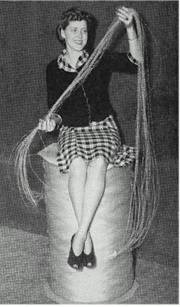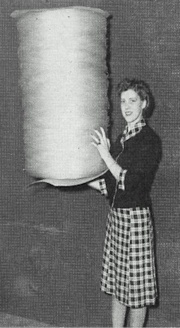Difference between revisions of "Bubblefil"
Jump to navigation
Jump to search
m (Text replace - "== Authority ==" to "== Sources Checked for Data in Record ==") |
|||
| Line 23: | Line 23: | ||
° G.Cook, ''Handbook of Textile Fibres:II. Man-made Fibres'', 5th edition, Merrow Publishing Co., Durham, England, 1984. | ° G.Cook, ''Handbook of Textile Fibres:II. Man-made Fibres'', 5th edition, Merrow Publishing Co., Durham, England, 1984. | ||
| − | == | + | == Sources Checked for Data in Record == |
* J.Gordon Cook, ''Handbook of Textile Fibres:II Man-made Fibres'', Merrow Publishing Co. , Durham, England | * J.Gordon Cook, ''Handbook of Textile Fibres:II Man-made Fibres'', Merrow Publishing Co. , Durham, England | ||
Revision as of 13:16, 29 April 2016
Description
[DuPont] A brand name for a bubble-filled Viscose rayon fiber. Bubblefil was first produced during W.W.II as a substitute for imported Kapok. It is made by injecting air inside the rayon filament during extrusion. The lightweight buoyant fiber was used in life jackets, pontoons, and insulated clothing (Cook 1984).
Synonyms and Related Terms
bubblefill (sp)
Other Properties
Weighs 1.5 pound per cubic foot.
Bubbles remain intact at altitudes above 50,000 feet, and temperature above 200F and below 0F.
It has low thermal conductivity.
Additional Information
° Old Hickory Record: Cellophane
° G.Cook, Handbook of Textile Fibres:II. Man-made Fibres, 5th edition, Merrow Publishing Co., Durham, England, 1984.
Sources Checked for Data in Record
- J.Gordon Cook, Handbook of Textile Fibres:II Man-made Fibres, Merrow Publishing Co. , Durham, England
- Website address 1 Comment: Old Hickory Resord at http://oldhickoryrecord.com/bubblfill.htm

